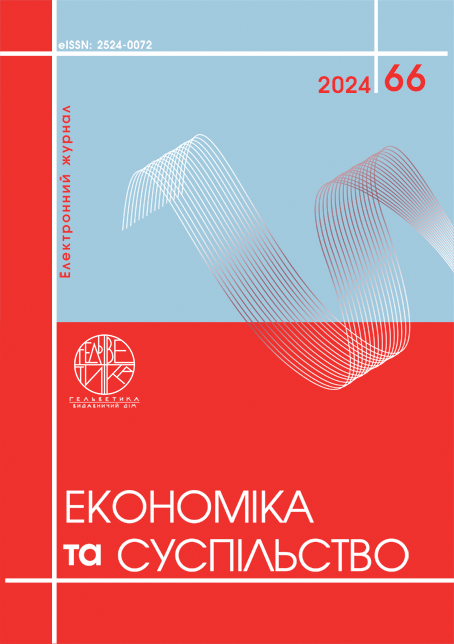TRANSFORMATION OF THE ROLE AND QUALITIES OF THE LEADER IN THE NEW MANAGEMENT PARADIGM
Abstract
The purpose of the research is related to the substantiation of the directions of the transformation of the role of the leader in the new management paradigm and the structuring of the key qualities of the leader, which will contribute to the support of transformational leadership. The relevance of the study is that leadership is a key factor in the progressive development of teams and organizations, adapting to changes in the external and internal environment. The leader must respond to these changes in a timely manner, which requires constant improvement of his experience, qualities, skills and management style. In the conditions of the transformation of the managerial paradigm in Ukraine, especially in the context of martial law, the issue of leadership takes on special importance. Society and business are faced with the need to form new leaders who are able to quickly make decisions in conditions of uncertainty and numerous threats, which makes this topic extremely relevant for further scientific research. The features of a new management paradigm, which actualizes a certain set of necessary (desirable) qualities of a leader and his mastery of new competencies, are defined. Among these features, we highlight the following: a change in emphasis from the process to the result; loosening and democratization of control and increasing trust in employees; transition from restraint, "closedness" to emotionality; shifting the focus from material values to intangible values; moving away from centralization in favor of delegation; the importance of creating an inclusive environment for all team members; active use of digital technologies; dissemination of the online format of communications and interaction. It was emphasized that the key roles of a modern leader should be: Catalyst, Coach, Architect, Visionary. The progressiveness of transformational leadership based on such components as personalized attention to everyone, intellectual stimulation, inspiring motivation and charismatic influence of the leader has been proven. A structured classification of the qualities of a modern leader is proposed, which should be the basis of a leader's self-diagnosis and further development of his leadership potential. This reveals the practical significance of the conducted research.
References
Григор’єва О. Яким має бути лідер у часи війни, щоб команди досягали результатів — досвід EPAM. URL: https://vctr.media/ua/yakim-maye-buti-lider-u-chasi-vijni-shhob-komandi-dosyagali-rezultativ-dosvid-epam-208995/
Другова О.С. Гендерна рівність у лідерстві. Економіка та суспільство. 2024. Випуск 65. DOI: https://doi.org/10.32782/2524-0072/2024-64-10
Карковська В.Я., Дорош І.М. Сучасне лідерство: особливості, вимоги, проблеми та помилки. Держава та регіони. 2019. № 5 (110). С. 98-102.
Савицька О. М., Долгова Л. І. Підходи до планування концепції системного лідерства на підприємствах в умовах трансформаційних змін бізнесу та розвитку цифрової економіки. Ефективна економіка. 2021. №7. DOI: 10.32702/2307-2105-2021.7.96.
Чорна А. Яким має бути лідер у часи війни: тези панельної дискусії на Global Leadership Forum. URL: https://www.work.ua/ru/articles/expert-opinion/3262/
Шаломова А.О., Ігнатьєва І. А. Дослідження різних моделей лідерства та їх вплив на результативність групової діяльності. URL: https://ekmair.ukma.edu.ua/server/api/core/bitstreams/2a819e32-12f1-4602-9e9f-2e763e8b6670/content
Hryhorieva O. Yakym maie buty lider u chasy viiny, shchob komandy dosiahaly rezultativ — dosvid EPAM [What a wartime leader needs to be for teams to achieve results—the EPAM experience]. Available at: https://vctr.media/ua/yakim-maye-buti-lider-u-chasi-vijni-shhob-komandi-dosyagali-rezultativ-dosvid-epam-208995/ (accessed August 08, 2024)
Druhova O. S. (2024) Henderna rivnist u liderstvi [Gender equality in leadership]. Ekonomika ta suspilstvo - Economy and society. Vol. 65. DOI: https://doi.org/10.32782/2524-0072/2024-64-10 (accessed August 02, 2024)
Karkovska V.Ia. Dorosh I.M. (2019) Suchasne liderstvo: osoblyvosti, vymohy, problemy ta pomylky [Modern leadership: features, requirements, problems and mistakes]. Derzhava ta rehiony- State and regions. Vol. 5 (110). pp. 98-102.
Savytska O. M., Dolhova L. I. (2021) Pidkhody do planuvannia kontseptsii systemnoho liderstva na pidpryiemstvakh v umovakh transformatsiinykh zmin biznesu ta rozvytku tsyfrovoi ekonomiky [Approaches to the planning of the concept of system leadership at enterprises in the conditions of transformational business changes and the development of the digital economy]. Efektyvna ekonomika - Efficient economy. Vol. 7. DOI: 10.32702/2307-2105-2021.7.96 (accessed August 05, 2024)/
Chorna A. Yakym maie buty lider u chasy viiny: tezy panelnoi dyskusii na Global Leadership Forum [What a leader should be in times of war: theses of a panel discussion at the Global Leadership Forum]. Available at: https://www.work.ua/ru/articles/expert-opinion/3262 (accessed August 10, 2024).
Shalomova A.O., Ihnatieva I. A. Doslidzhennia riznykh modelei liderstva ta yikh vplyv na rezultatyvnist hrupovoi diialnosti [Study of different models of leadership and their influence on the effectiveness of group activities]. Available at: https://ekmair.ukma.edu.ua/server/api/core/bitstreams/2a819e32-12f1-4602-9e9f-2e763e8b6670/content (accessed August 09, 2024).


